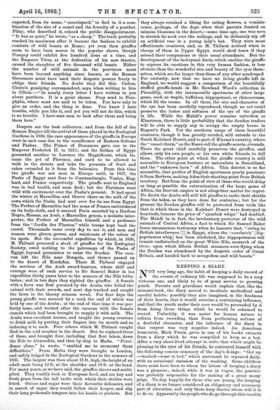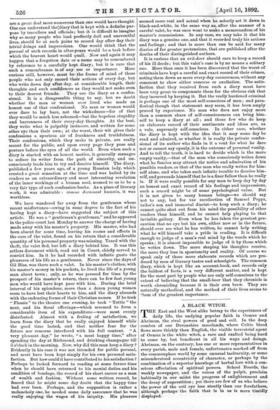KEEPING A DIARY.
NOT very long ago, the habit of keeping a daily record of the events of ordinary life was supposed to be a very virtuous one, and likely to be of great service to growing youth. Parents and guardians would explain that, like the account-book, the diary served to inculcate methodical and careful habits : possibly they also imagined, in the fondness of their hearts, that it would exercise a restraining influence, and that the youth under their care would be persuaded by it from doing those things which he would be ashamed to record. Unluckily, it was easier for human nature to refrain from recording than from performing actions of a doubtful character, and the influence of the diary in that respect was very negative indeed. An American humourist, Mark Twain, gives in one of his books extracts from a diary which he was compelled to keep as a boy. After a very short-lived attempt to write that which might be pleasing to the eyes of his friends, he contented himself with the following concise summary of the day's doings : "Got up —washed—went to bed," which statement he repeated daily, with an occasional omission of the washing. Some children there mast have been to whom the labour of keeping a diary was a pleasure ; indeed, while it was in vogue, the practice was probably responsible for the making of a great many prigs. To-day, happily for those who are young, the keeping of a diary is no longer considered an obligatory and necessary part of education, and only those keep diaries whose will it is to do so. Apparently the people who do go through this trouble are a great deal more numerous than one would have thought. One can understand the:diary that is kept with a definite pur- pose by travellers and officials ; but it is difficult to imagine why so many people who lead perfectly dull and uneventful lives, should be at such pains to record day after day their trivial doings and impressions. One would think that the perusal of such records in after-years would be a task before which the bravest heart would quail. Now and again it may happen that a forgotten date or a name may be remembered by reference to a carefully kept diary; but it is rare that such a remembrance is of any use or importance. More curious still, however, must be the frame of mind of these people who not only record their actions of every day, but who write down day after day, at considerable length, their thoughts and such confidences as they would not make even to their dearest friends. They use the diary as a confes- sionaL It is a disagreeable thing to say, but we doubt whether the man or woman ever lived who made an honest use of that confessional. No man or woman would ever dare to lay bare, not the wickedness—for of that they would be much less ashamed—but the hopeless stupidity and barrenness of their every-day thoughts. At the best, they write what is palpably insincere, and written for some other eye than their own; at the worst, their wit gives their confessions a spurious air of frankness and truthfulness. Their confessions, which they make in private, are really meant for the public, and upon every page they pose and posture before the eyes of all the world. Even when such a diary is started with an honest motive, it generally manages to seduce its writer from the path of sincerity, and un- consciously leads him to try and deceive himself. The diary, published a few years ago, of a young Russian lady, which created a great sensation at the time and was hailed by its readers as an extraordinary and most interesting revelation of the inner workings of a human soul, seemed to us to be a very fair type of such confession-books. As a piece of literary work, it was admirable : comme document humain, it was worthless.
We have wandered far away from the gentleman whose recent misfortunes—owing in some degree to the fact of his having kept a diary—have suggested the subject of this • article. He was a "gentleman's gentleman," and he appeared in the police-court last Monday to answer the charge of having made away with his master's property. His master, who had been absent for some time, leaving his rooms and effects in the care of the valet, found on his return that a considerable quantity of his personal property was missing. Taxed with the theft, the valet fled, but left a diary behind him. It was this artless document which, read out in Court, chiefly served to convict him. In it he had recorded with infinite gusto the pleasures of his life as a gentleman. Never since the days of Gil Bias, was there such a valet. In his master's clothes, with his master's money in his pockets, he lived the life of a young man about town ; only, as he was pressed for time by the prospect of his master's return, there can be few fast young men who would have kept pace with him. During the brief interval of his splendour, more than a dozen young women seem to have lost their hearts to him, and the diary abounds with the endearing forms of their Christian names. If he took "Flossie" to the theatre one evening, he took " Tottie " the next, and his floral offerings—which seeemed to form a considerable item of his expenditure—were most evenly distributed. Almost with a feeling of satisfaction, we learn from the diary that he really enjoyed himself while the good time lasted, and that neither fear for the future nor remorse interfered with his full content. "A very pleasant day," he wrote, "a most happy time," after spending the day at Richmond, and drinking champagne till 3 o'clock in the morning. Now, why did this man keep a diary? Evidently in his case it was not intended for public perusal, and must have been kept simply for his own personal satis- faction. But how could it have contributed to his satisfaction ? Perhaps he looked forward to reading at some future time when he should have returned to his menial duties and his condition of bondage, the record of his short career as a man of wealth and fashion. Without some written record, he feared that he might sonic day doubt that the happy time had ever been. Perhaps, and the supposition is rather a melancholy one, he needed some daily assurance that he was really enjoying the wages of his iniquity. His pleasure seemed more real and actual when he soberly set it down in black-and-white, in the same way as, after the manner of a careful valet, he was once wont to make a memorandum of his master's commissions. In any case, we may take it that his diary was a genuine one, and that it recorded truly his actions and feelings ; and that is more than can be said for many diaries of far greater pretensions, that are published after the deaths of their distinguished authors.
It is curious that an evil-doer should care to keep a record of his ill deeds ; but this valet's case is by no means a solitary one. More than once it has been discovered that the worst of criminals have kept a careful and exact record of their crimes, noting them down as mere every-day_ occurrences, without any comment to show either remorse or exultation. The satis- faction that they received from such a diary must have been very great to compensate them for the obvious risk that they incurred by keeping it. But the really hardened criminal is perhaps one of the most self-conscious of men ; and para- doxical though that statement may seem, it has been amply proved by experience. No man who does not enjoy more than a common share of self-consciousness can bring him- self to keep a diary at all ; and those few who do keep an elaborate record of their sentiments and ideas are, as a rule, supremely self-conscious. In either case, whether the diary is kept with the idea that it may some day be read and admired, or whether it is really the private confes- sional of its author who finds in it a vent for what he dare not or cannot say openly, it is the outcome of personal vanity. And to tell the truth, it is hard to decide which is the more empty vanity,—that of the man who consciously writes down what he fancies may attract the notice and admiration of his possible readers, or that of the man who really writes for him- self alone, and who takes such infinite trouble to deceive him- self, and persuade himself that he is a finer fellow than he really is. If it were really possible for any man to keep day by day an honest and exact record of his feelings and impressions, such a record might be of some psychological value. But it is not given to many human beings—we should say not to any, but for the recollection of Samuel Pepys, tailor's son and immortal diarist—to keep such a diary ; he cannot quite shut out from his mind the possibility of other readers than himself, and he cannot help playing to that invisible gallery. Even when he has taken the greatest pre- caution that no eye but his own, either now or in the future, should ever see what he has written, he cannot help writing what he will himself take a pride in reading. It is difficult enough to judge of a man's real mind by the words which he- speaks ; it is almost impossible to judge of it by those which he writes down. The more shaping his thoughts receive, the more they lose in spontaneity and reality. Of course we speak only of those more elaborate records which are pro- duced by men of literary tastes and schoolgirls. The common diary, which is kept like an account-book, and records only the baldest of facts, is a very different matter, and is kept for the most part by people who are only self-conscious to the
of believing that the small-beer that they chronicle is worth chronicling because it is their own brew. They are- naturally methodical, and the method of their lives seems to. them of the greatest importance.

































 Previous page
Previous page